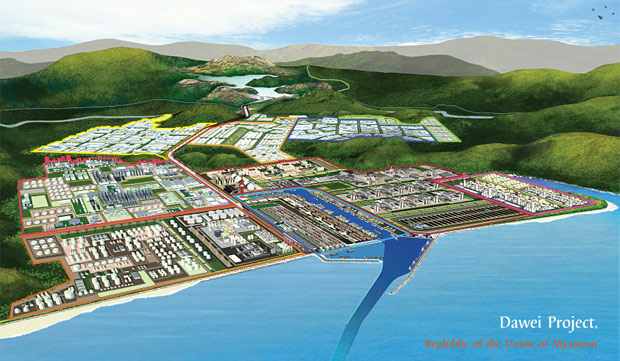A community-based organization (CBO) in Tavoy [Dawei] says that claims made by the Italian-Thai Development Company (ITD) that it has relocated the majority of villagers from the area affected by the construction of the Dawei Project are false.
The local CBO, which calls itself “Tavoyan Voice,” was responding to an interview in the Thai daily Bangkok Post on November 12 when Premchai Karnasuta, the managing director of ITD, was quoted as saying: “The big job, which is the relocation of residents in the project area, has been almost done. The next task is the construction, which is not that easy to complete all within three years. It is a challenge.”

However, according to Tavoyan Voice: “Over 30,000 villagers from 16 villages in the US $50 billion project area are slated for relocation, but community leaders insist that no one has yet been relocated.”
A spokesperson for the CBO, which is based in Tenasserim Division close to the site where the multi-billion-dollar deep sea port and industrial complex is being built, said that Mr Premchai, 21 percent stakeholder in ITD, made the comments in an attempt to persuade foreign firms to invest in the project.
“They haven’t even discussed the issue of relocation at a grassroots level yet,” spokeswoman Lwin Lwin told Mizzima. “Their claim is false and we regard it only as pretext to lure foreign investors.
“Though ITD is indeed in the process of negotiating compensation with the local community, it has not yet got the nod from the majority of villagers,” she said.
Lay Lwin from the Dawei Development Association (DDA) said that over 30,000 local villagers from Yebyu and Launglon townships in Dawei District were scheduled to be relocated to three newly built villages.
Five villages in Yebyu (namely Mudu, Paradup, Leshaung, Singyi and Mayingyi) are to be relocated to a new town called “Bagawa”; while 10 villages in Launglon Township are also waiting to be uprooted and sent to a new town outside the Special Economic Zone (SEZ).
Lay Lwin said that just over 340 new houses had already been built in the new Bagawa town, north of the SEZ, but that as far as he knows, only villagers from Mudu will be placed there before June 2013.
A local Buddhist abbot, U Awbatha, from Mayingyi village monastery, said that ITD negotiated relocation terms with only two villages, Mudu and Nyaungbinseik. He said that most of the villagers did not want to move.
“In Mudu, only a handful of people accepted the offer of relocation,” he said. “Most refused. And in Nyaungbinseik only three or four people said they would relocate voluntarily.”
The abbot said that most villagers are reluctant to relocate because they believe the land will be unsuitable for their livelihoods, namely farming and other agriculture-related vocations.
U Awbatha said that most villagers would prefer to turn down the offer of compensation and continue to live in their own ancestral homes.
Because of plans for constructing a hydroelectric dam alongside the Dawei SEZ, more than 180 households from Kalonehtar village in Yebyu Township have now also been told they must relocate. However, the villagers are refusing to move.
ITD signed an MoU with the Burmese government in 2008 to build the SEZ at Dawei, also known as Tavoy. ITD has a 75-year lease on the project, which will include a deep-sea port, large factories, office buildings, and trade and commercial zones.
The first phase of the project is estimated to cost some US $8.6 billion.
Burma’s President Thein Sein and Thai Premier Yingluck Shinawatra met on November 19 at the ASEAN Summit in Phnom Penh where they reportedly agreed to complete all urgent and priority projects at Dawei by 2015.


